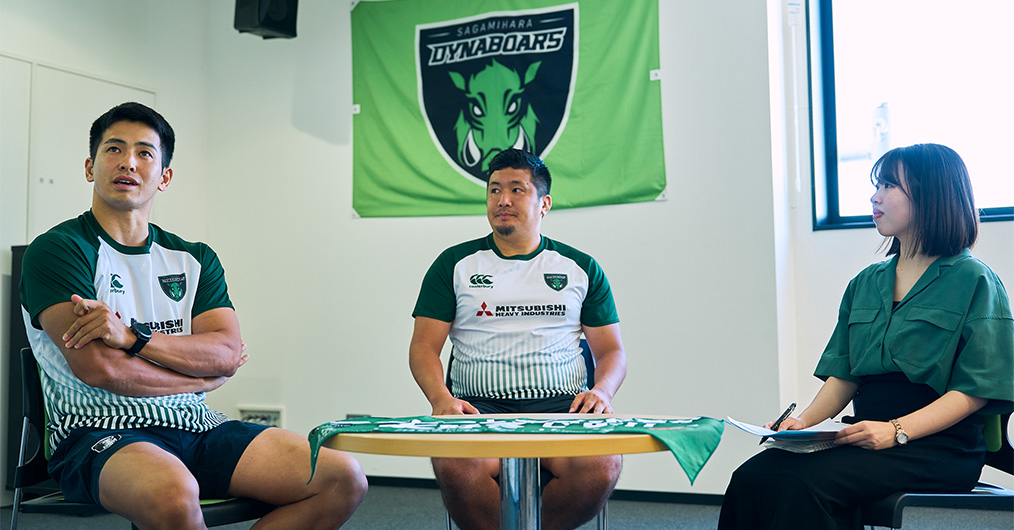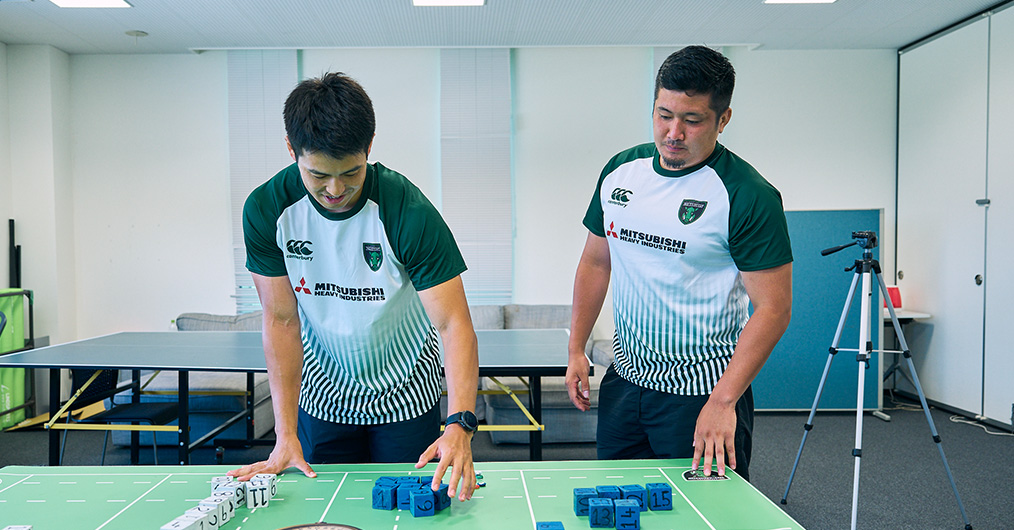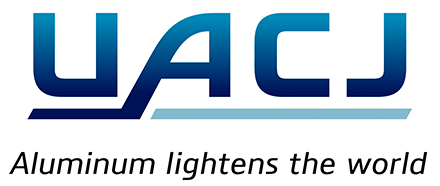RESEARCH
What Makes a Good Team That Brings Out the Best in People?
Exploring the Key to “Organizational Strength” Shared by Rugby and the Workplace!
Exploring the Key to “Organizational Strength” Shared by Rugby and the Workplace!
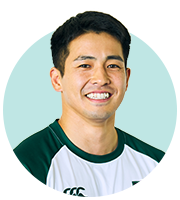
Featuring
Kōta Iwamura,
Mitsubishi Heavy Industries Sagamihara DynaBoars
Mitsubishi Heavy Industries Sagamihara DynaBoars
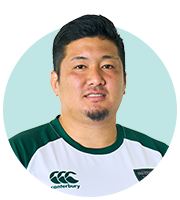
Featuring
Yūki Miyazato,
Mitsubishi Heavy Industries Sagamihara DynaBoars
Mitsubishi Heavy Industries Sagamihara DynaBoars

Interviewer
Riho Goto, UACJ
Whether in the workplace or on the sports field, bringing out the best in people and investing in them is a vital step toward sustainability. This time, we took a look into the world of professional sports to learn the secrets of team building! Riho Goto, from UACJ’s PR team, spoke with two players from the Mitsubishi Heavy Industries Sagamihara DynaBoars.

Mitsubishi Heavy Industries Sagamihara DynaBoars
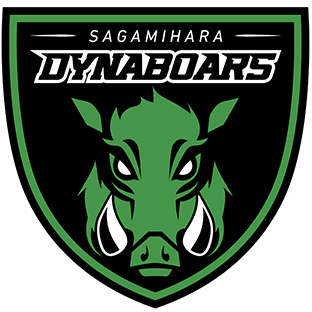
Based in Sagamihara City, Kanagawa Prefecture, the Mitsubishi Heavy Industries Sagamihara DynaBoars are one of Japan’s premier rugby union teams, competing in the top-tier domestic league, Japan Rugby League One. With a strong commitment to regional and social engagement, the DynaBoars leverage rugby as a platform to interact with and contribute to their local community. Their competitive season typically takes place on weekends from December through May.
Kōta Iwamura – Scrum-half
Born in 1993 in Fukuoka Prefecture, Kōta Iwamura started playing rugby at the age of four. He was selected for the Fukuoka Junior High School representative team and went on to win the national championship with Higashi Fukuoka High School. After enrolling at Doshisha University, he led the team to victory in the Kansai University League. He has been with the Mitsubishi Heavy Industries Sagamihara DynaBoars since 2021 and has been serving as team captain for three consecutive seasons since 2022. His position is scrum-half.
Yūki Miyazato – Hooker
Born in 1997 in Okinawa Prefecture, Yūki Miyazato was active in basketball and long-distance relay clubs through junior high school before starting rugby at Nago Commercial & Technical High School. After graduating, he attended Waseda University, where he became a key forward. He joined the Mitsubishi Heavy Industries Sagamihara DynaBoars in 2019 and plays as a hooker.


Today, I’ve come to… yes, the rugby field!
This is the training ground of the Mitsubishi Heavy Industries Sagamihara DynaBoars, based in Sagamihara City, Kanagawa Prefecture. I’m about to jump right into an interview with Kōta Iwamura and Yūki Miyazato!
This is the training ground of the Mitsubishi Heavy Industries Sagamihara DynaBoars, based in Sagamihara City, Kanagawa Prefecture. I’m about to jump right into an interview with Kōta Iwamura and Yūki Miyazato!
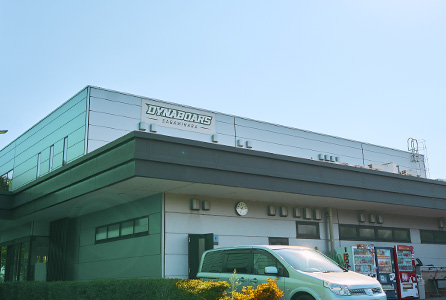
Why is organizational strength so important in rugby?
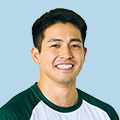
Iwamura
Well, rugby is a sport where each position requires players with different characteristics. It’s a sport where fulfilling your role is absolutely essential.

Goto
I see. You can really tell the difference in roles just by looking at the variations in play styles and physiques.

Iwamura
Exactly. That’s why the ability to bring together players with such diverse qualities—and make the most of them—organizational strength, in other words, can have a huge impact on whether we win or lose.

Goto
Ah, that makes sense! That’s why in rugby, phrases like “One Team” or “One for All, All for One” highlight the importance of organizational and team strength.

Iwamura
Right. Of course, we all strive to fulfill our individual roles, but that alone doesn’t unify the team. Leadership and direction from the head coach and coaching staff are critical, and we players approach every day with the mindset that their direction is absolute.

Goto
Interesting. It seems similar to how corporate organizations work.
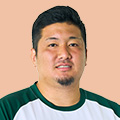
Miyazato
Yes, there might be some similarities there.

Goto
In both companies and sports teams, identifying people’s strengths and assigning them to the right roles is key. That’s quite a discovery!
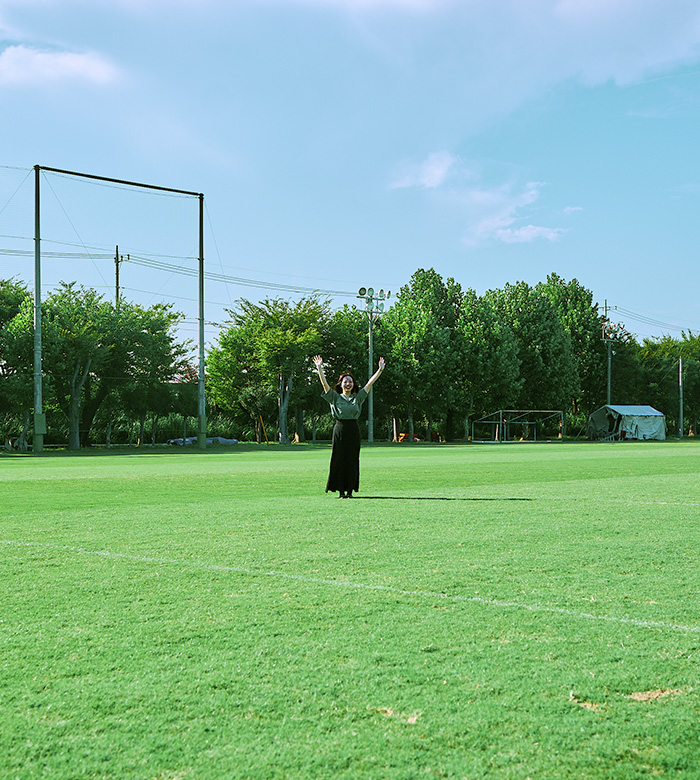
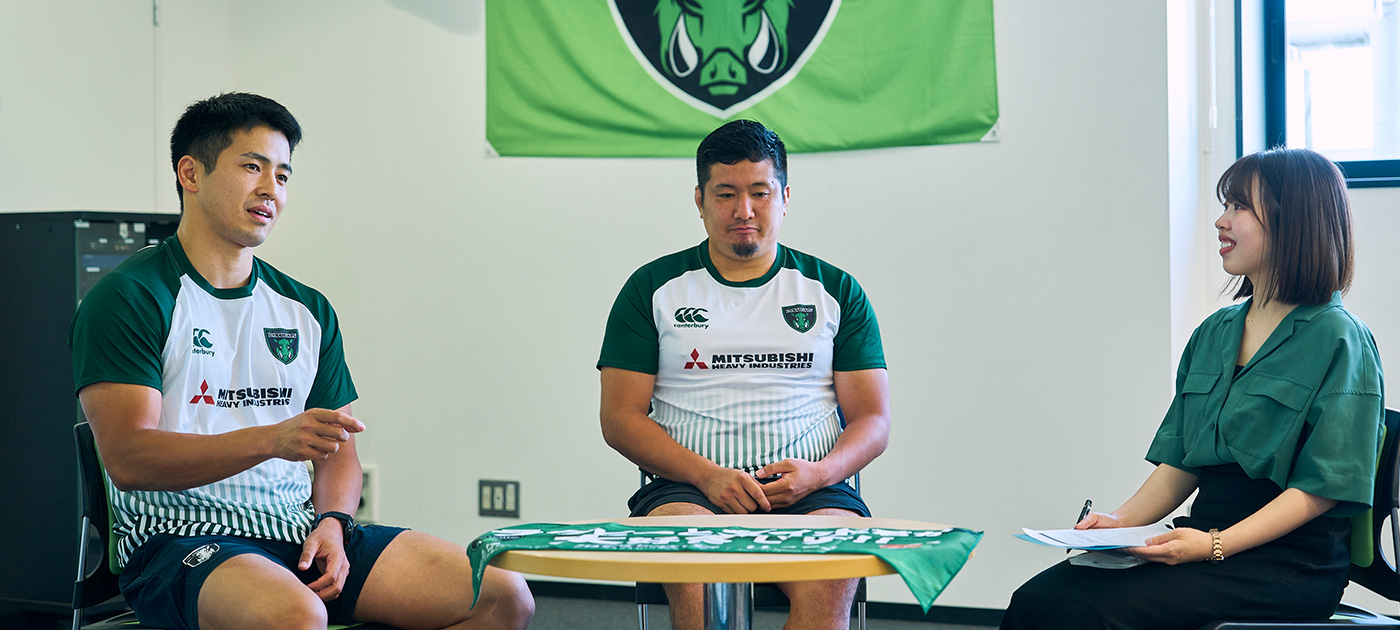
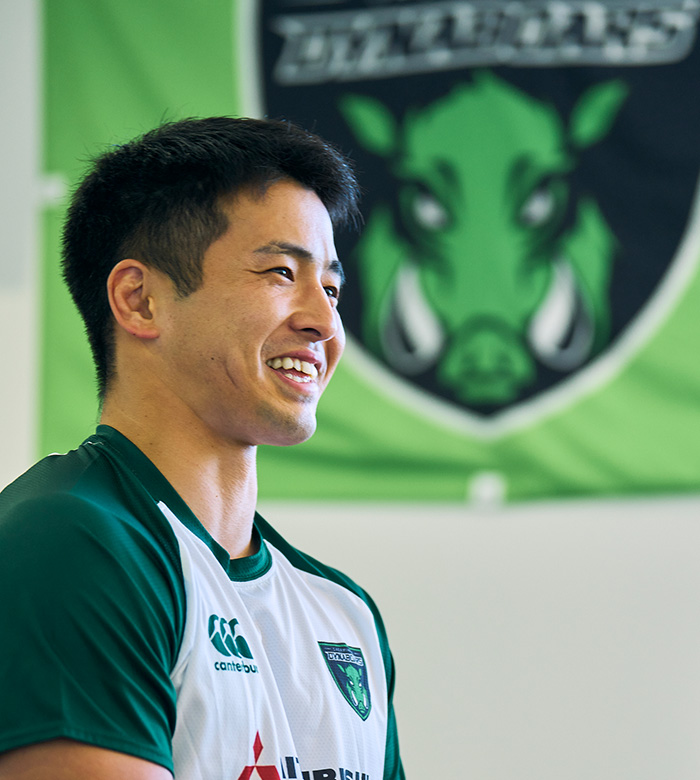
How can you strengthen the team’s performance?

Iwamura
As I mentioned earlier, the coaches’ policies and direction are extremely important. What really matters is to repeatedly communicate those policies, their overall direction, and the concrete actions derived from them. As captain, before each game in the locker room, I always put into words, “This week’s theme is this,” so that everyone is on the same page.

Miyazato
I believe the foundation of team strength lies in daily communication. Whether or not we communicate regularly makes a big difference in how well we can work together on the field.

Iwamura
Another effective way for our team to communicate is through what we call “nominication”—communication over drinks.

Goto
Why is that?
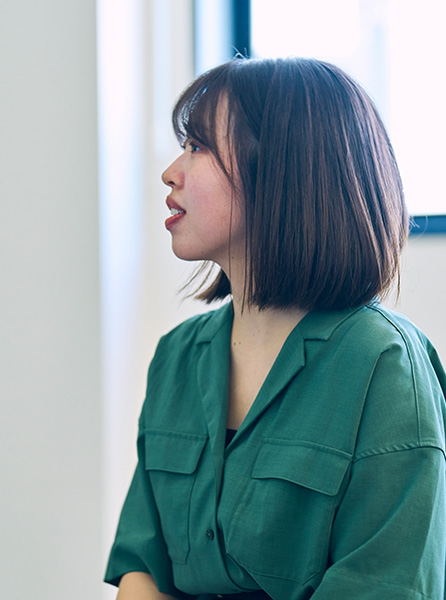

Iwamura
When you talk over drinks, people tend to open up more easily. Even foreign players who are usually quiet show a different side of themselves, and seeing that helps us feel closer to them.

Miyazato
Actually, Iwamura is really strong when it comes to drinking.

Iwamura
Not at all! (laughs)

Miyazato
But having that space outside of rugby to connect helps build trust among teammates.

Goto
A team drinking party… sounds like a lot of fun!
What do you do to make meetings more effective?

Miyazato
Before our meetings, we always start with an icebreaker. At the DynaBoars, the team staff take the initiative to plan these, and for example, the other day they played a funny video to lighten the mood.

Iwamura
Also, each season we divide the team into four groups. We play different games and give each group points, then compete to see which group scores the most.

Goto
What kind of games do you play?

Iwamura
For example, there’s a game where players use chopsticks to carry beans. It gets pretty lively.

Goto
That does sound fun.

Miyazato
Of course, having a clear purpose for meetings is important, but creating the right atmosphere is just as crucial.

Goto
When the atmosphere is heavy, it’s hard to come up with ideas, so games work well as icebreakers. We should definitely try that ourselves when a meeting looks like it might turn into a “scary one” (laughs).

Iwamura
Oh, we have our own “scary meetings” too. After we’ve lost a few games in a row, the meetings get really tense (laughs).
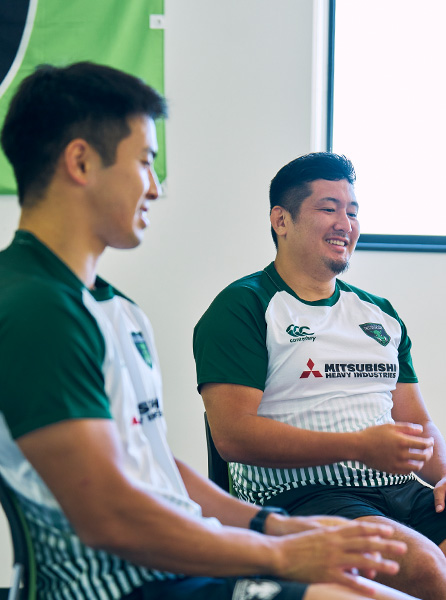
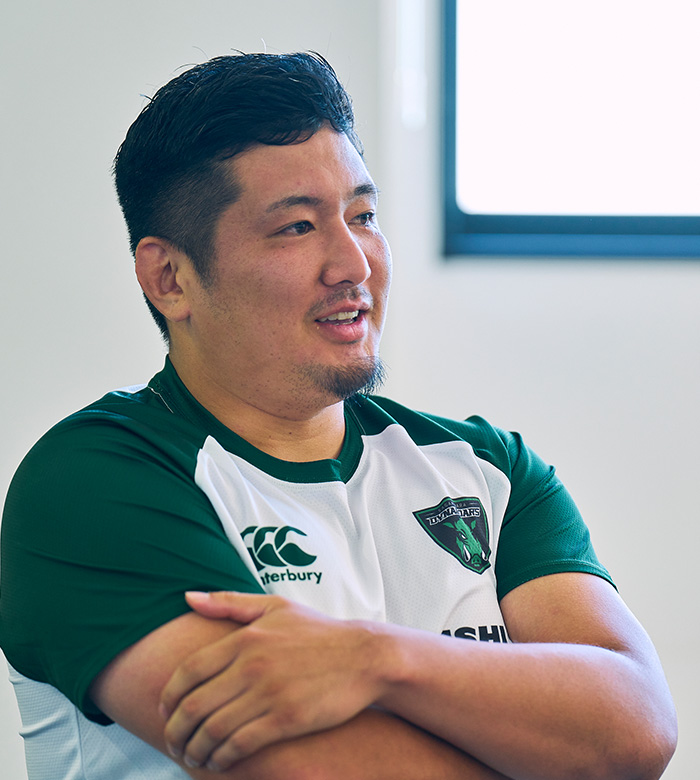
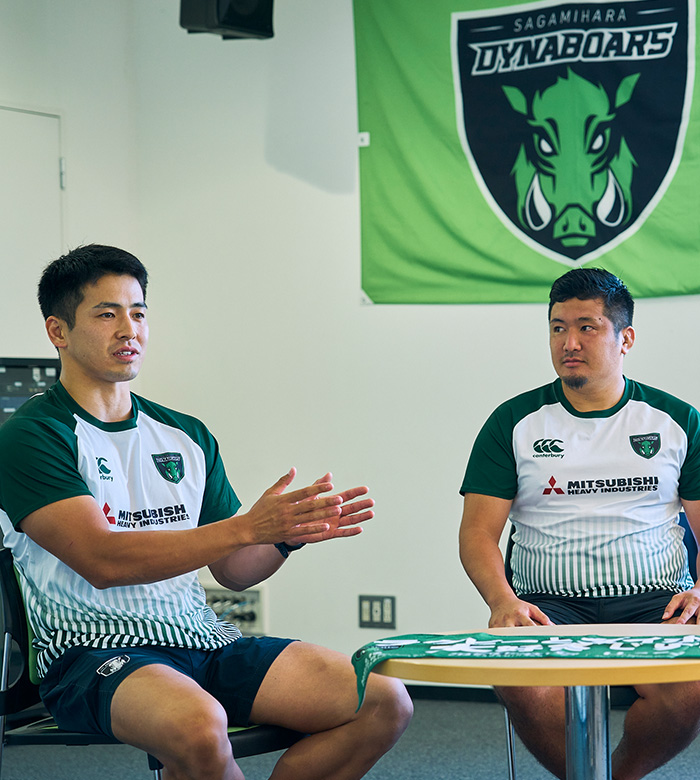
What qualities are required of a leader who leads the team?

Miyazato
I think it’s about being the one who understands the team’s policy better than anyone else and fully internalizes it. Otherwise, you can’t communicate it properly to the rest of the team.

Goto
Both of you have served as leaders of the team, right? In a company, it would be like middle managers who need to understand top management’s policies and break them down for each department. It sounds like achieving 100% understanding might be surprisingly difficult.

Iwamura
But that’s incredibly important.

Goto
Are there times when you don’t fully agree with the policy but still have to convey it?

Iwamura
It’s not that such situations never happen. We have many players and many opinions. But the coaching staff decides on the core direction of the team, so we accept that and share it in a way that brings everyone together for the good of the team.

Goto
That’s what “One Team” is all about!
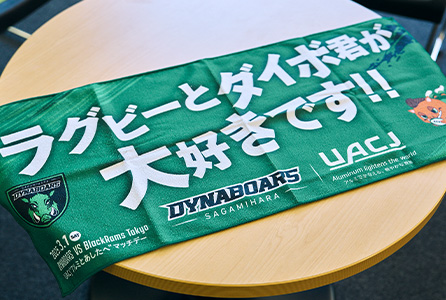
What makes an ideal leader?

Iwamura
Someone whose words and actions are consistent. No matter how good the words sound, if the actions don’t back them up, you won’t want to follow them.

Miyazato
In that sense, I think Iwamura really is the ideal leader.

Iwamura
Oh, come on, you’re exaggerating (laughs).

Miyazato
No, I mean it (laughs)! He has a clear line between on and off the field, and when he’s on, he’s always the first one to arrive at the training ground and start preparing. Watching him, I think to myself, “I could never do that.”

Goto
So Iwamura-san, you seem like the type who leads more through actions than words. Do you also have moments when you speak up to your teammates?

Iwamura
It really depends on the person. For me, I don’t particularly need someone to say a few lighthearted words when things get tough. If someone speaks to me, I’d rather they give me concrete feedback. Miyazato, on the other hand, is the type who prefers to be spoken to, I think.

Miyazato
Absolutely—I want them to fire me up (laughs). There are moments when I lose focus, and a good shout helps me reset my mind.

Iwamura
Finding the right way to talk to and approach each individual might be another skill a leader needs. If you understand your teammates well through daily communication, you can figure that out.

Goto
I see. That’s very insightful!
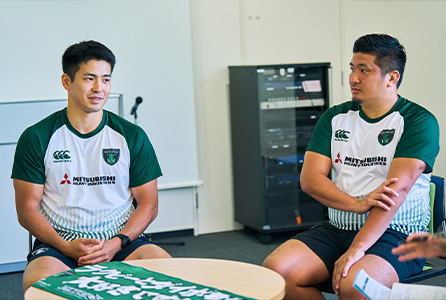

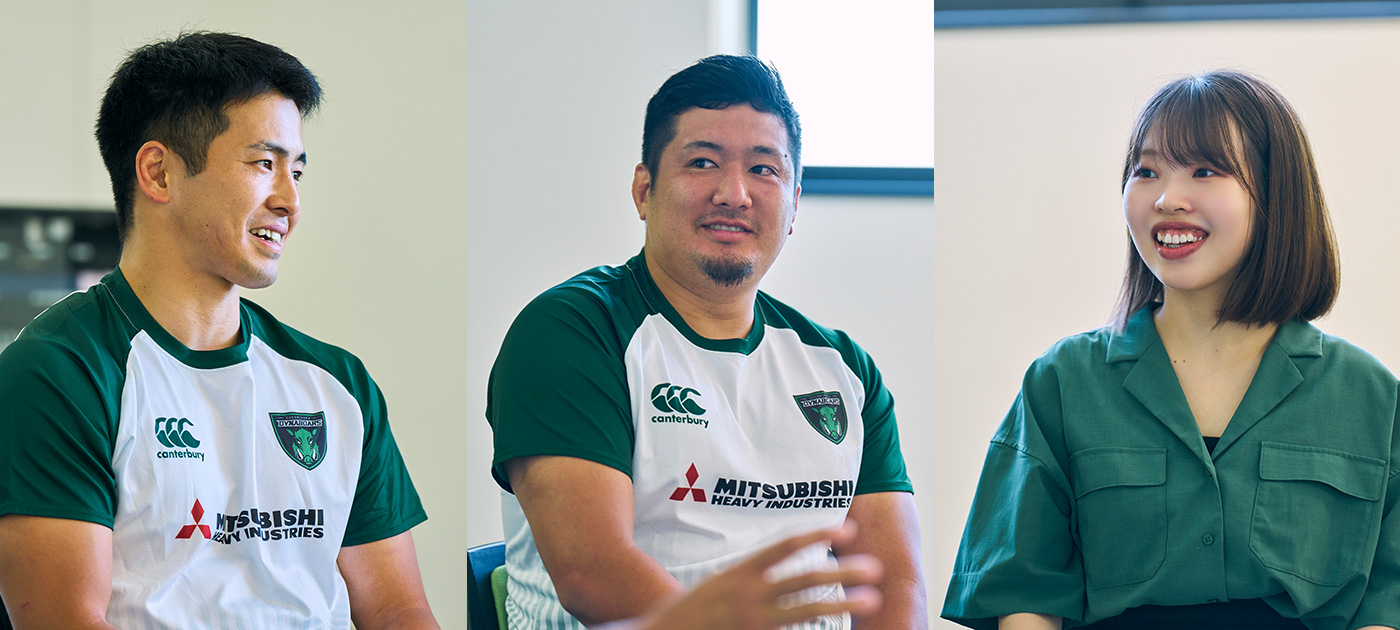
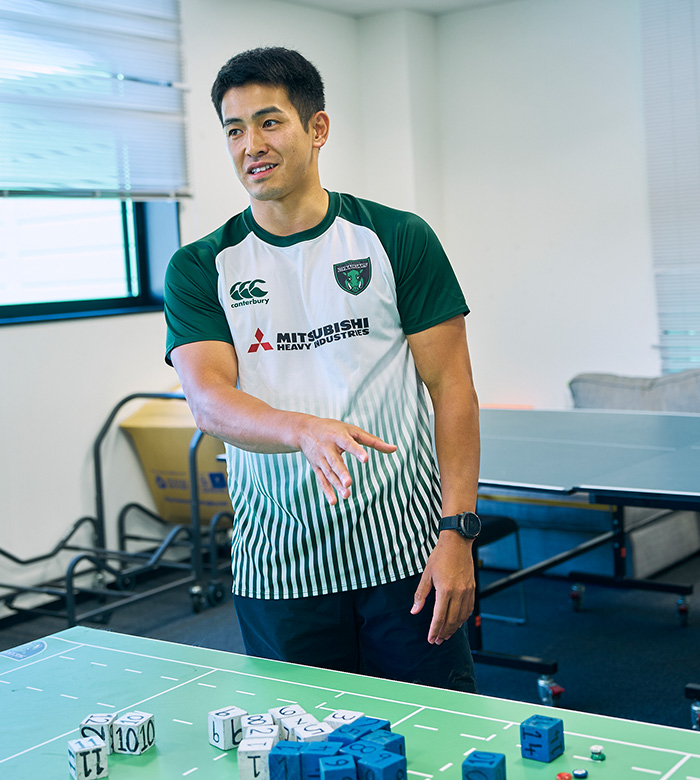
What if you don’t agree with the team’s direction?

Iwamura
As professional athletes, if you can’t accept the team’s policy, you simply won’t get to play. That’s why it’s so important to internalize the team’s direction, make it your own, and put it into action.

Goto
So it comes down to commitment.

Iwamura
But isn’t it the same in business? People who understand the company’s direction and align themselves with it are the ones who get opportunities to succeed.
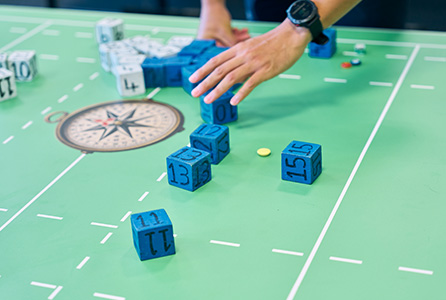

Goto
That makes sense.

Iwamura
When I first started out, I couldn’t do that. My pride sometimes got in the way, and I sometimes let my disagreement show. But over time, I began to understand my role better.

Miyazato
So even you had times like that, Iwamura?

Iwamura
Fortunately, the coaching staff we have now share a philosophy that’s very close to my own, so there’s rarely anything I can’t accept. I trust that if we follow their lead, results will come.
What do you do to keep the team from losing its sense of direction?

Iwamura
At the DynaBoars, we use a “compass” as a way to align on the direction we need to head toward.

Goto
A compass?

Iwamura
Yes, this.
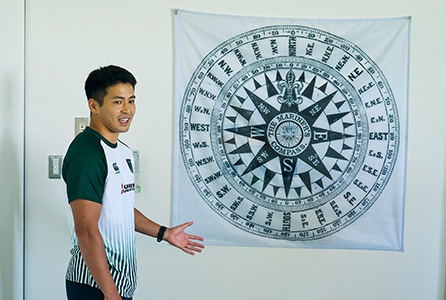

Iwamura
Mitsubishi Heavy Industries originally started as a shipyard in Nagasaki. Inspired by that history, we adopted the concept of a “navigational compass” to help us confirm the team’s direction.
We set “North” as the direction we all strive toward. We also assign meaning to the other directions, so we can discuss where we stand right now and what elements we might be lacking, all while looking at this compass.
We set “North” as the direction we all strive toward. We also assign meaning to the other directions, so we can discuss where we stand right now and what elements we might be lacking, all while looking at this compass.

Goto
Visualizing and sharing the direction like that is a really interesting idea. Having a clear point of reference makes it much easier to understand.
At UACJ as well, we use a compass to illustrate our employees’ code of conduct and our sustainability direction toward creating a lighter world 100 years from now.
At UACJ as well, we use a compass to illustrate our employees’ code of conduct and our sustainability direction toward creating a lighter world 100 years from now.
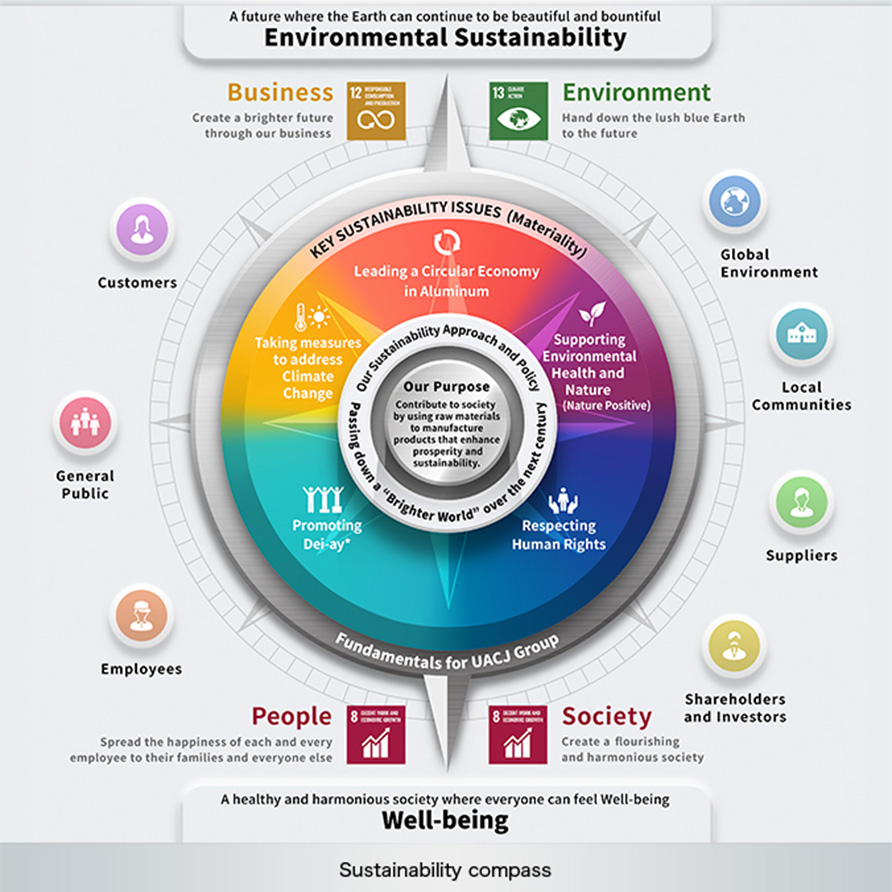
For more details, please see “UACJ Group sustainability.”
https://www.uacj.co.jp/english/sustainability/highlight/index.htm
https://www.uacj.co.jp/english/sustainability/highlight/index.htm
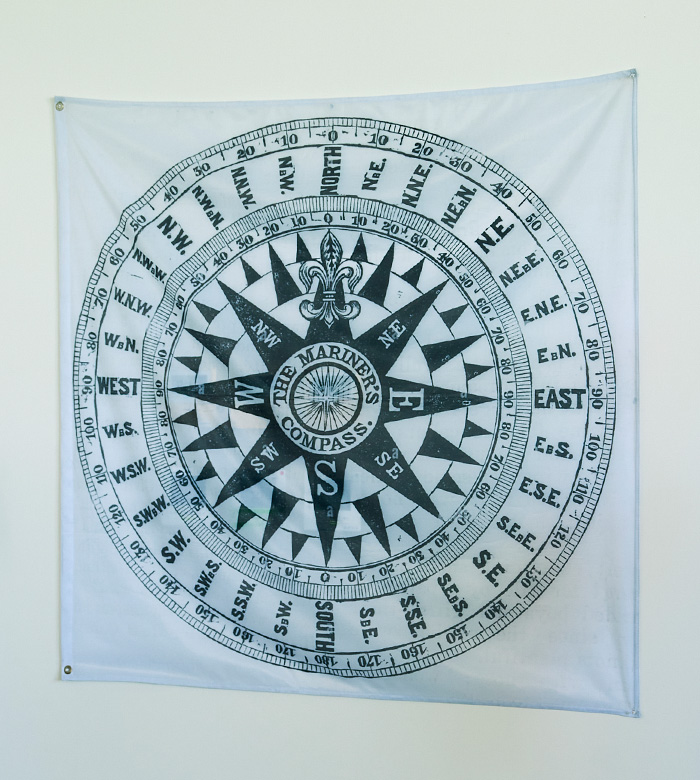
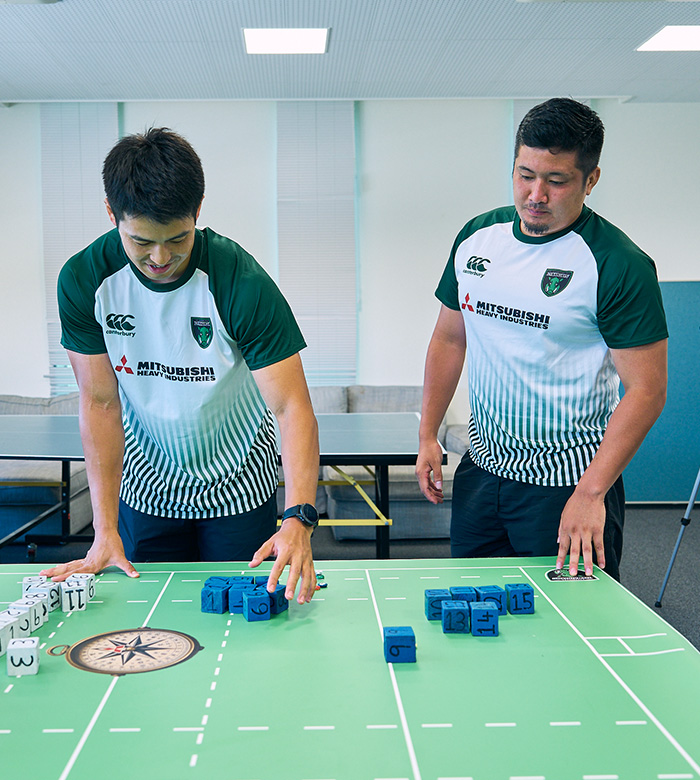
How do you find the best way to contribute as part of the team?

Miyazato
I think you can see where you can contribute once you fully understand and internalize the team’s policy.

Goto
That “fully understanding and internalizing” part seems to be the hardest thing to do…

Miyazato
I think it all comes down to letting go of unnecessary pride and being open to everything.

Goto
That’s impressive…!
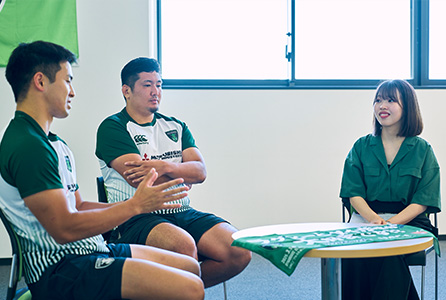

Miyazato
This comes from my own experience. Back in college, I always played the No. 8 position, but as stronger juniors kept joining the team, one day I was suddenly moved to hooker.

Goto
No. 8 is a key position in the forward pack, right?

Miyazato
At the time, I didn’t know why, but when I finally played my first game as hooker, I realized something—if I had insisted on staying at No. 8”, I probably wouldn’t have gotten to play at all.

Iwamura
That shows how well the team performed in that game.

Miyazato
Exactly. Instead of sticking to what I wanted to do, it’s more important to accept advice from others with an open mind. I think that attitude leads to growth.

Goto
So, through practice and building up small successes, you gradually discover your role.

Iwamura
Another way is to just ask your coach directly. We sometimes go to the coaching staff to ask what’s expected of us.

Goto
We’ve learned a lot today—about what individuals should think about as part of a team, and also about what’s required of those who lead and bring the team together. UACJ plans to step up its efforts in human capital management, so we hope to apply these insights. Thank you so much!

Iwamura

Miyazato
Thank you very much.
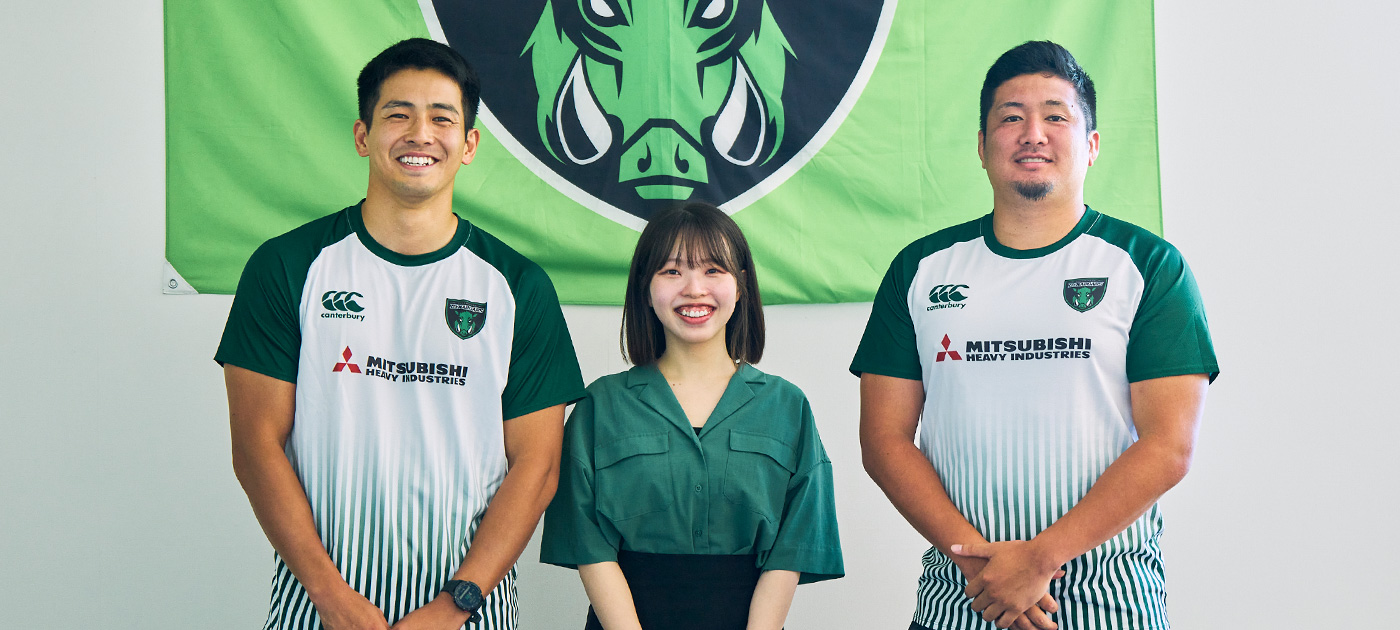


AFTER INTERVIEW

UACJ Riho Goto
I could really sense that the DynaBoars’ strong performance on the field comes from the trust they build with each other every day. Understanding both your own and others’ personalities—and applying that to everyday communication—is equally important in corporate team building. The idea of “letting go of your pride and being open to everything” really struck a chord with me, and I’m already trying to put it into practice myself!
Profile
I work in the Public Relations Group, sharing the appeal of UACJ and aluminum with the world. Lately, under the noble pretext of “using aluminum spoons,” I’ve been eating a lot of ice cream. I highly recommend it to everyone!
[UACJ Group’s Human Capital Management]
The UACJ Group is actively promoting human capital management initiatives.
For more details, please visit our corporate website:
“Enhancing Human Capital”
https://www.uacj.co.jp/english/sustainability/social/human-capital.htm
The UACJ Group is actively promoting human capital management initiatives.
For more details, please visit our corporate website:
“Enhancing Human Capital”
https://www.uacj.co.jp/english/sustainability/social/human-capital.htm
* The information in this article was current at the time of the interview.


